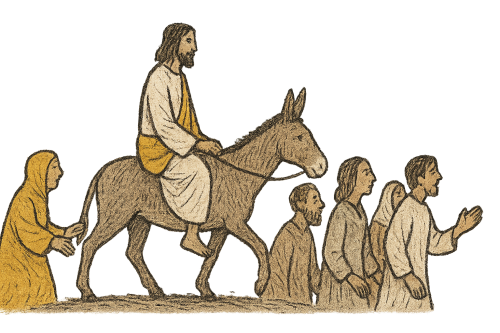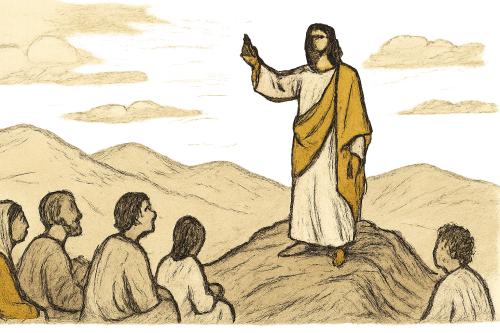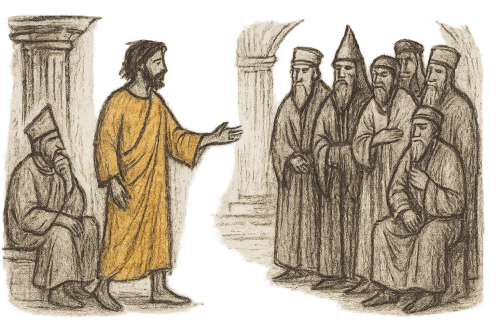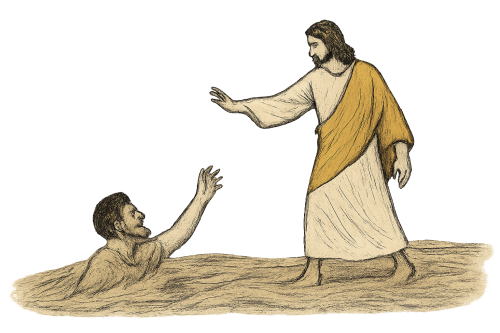Who did Jesus say He was? The New Testament Gospels record many statements Jesus made about Himself. Understanding these claims – in their biblical context and historical setting – can help us grasp what does the Bible say about Jesus and who He understood Himself to be.
Son of Man – Jesus’ Favourite Title
One title stands out as Jesus’ favourite way to refer to Himself: “Son of Man.” In fact, this phrase appears about 80 times in the Gospels, almost always from Jesus’ own lips.
Learn more: Son of Man Meaning in the Bible
Represents his Humanity
On the surface, “son of man” can simply mean “human” – emphasizing Jesus’ humanity. For example, Jesus said,
“The Son of Man came not to be served but to serve, and to give his life as a ransom for many” (Mark 10:45)
Mark 10:45
Represents his Divinity
However, Son of Man also carried a deeper, prophetic meaning. Jesus’ usage echoes a vision from Daniel 7 in the Old Testament, where a heavenly figure “like a son of man” comes with the clouds and is given everlasting authority (Daniel 7:13–14).
Jesus tapped into this prophecy to reveal His divine authority in a subtle way. He often spoke of the Son of Man in the third person, hinting at a messianic figure who is both human and exalted.
Jesus most likely used this phrase mainly so that only those with ears to hear in His audience would recognize the prophetic reference and recognise who Jesus was claiming to be.
It was not until just before his death on the cross that Jesus finally professed public ally and explicitly that he was the Messiah, when on trial before the Jewish council, the high priest asked if Jesus was the Messiah. Jesus answered boldly:
“I am,” said Jesus. “And you will see the Son of Man sitting at the right hand of the Mighty One and coming on the clouds of heaven.” (Mark 14:62)
Mark 14:62
In this dramatic moment and just before his crucifixion, Jesus finally, publicly and directly applied Daniel’s Son of Man vision to Himself. The phrase “seated at the right hand of Power” alludes to sharing God’s throne, and “coming with the clouds of heaven” points to divine authority. No wonder the high priest accused Jesus of blasphemy – Jesus was claiming a heavenly, kingly identity for Himself.
“Son of Man” reveals both Jesus’ humanity and His heavenly glory. He is one of us, yet much more. Jesus skilfully used this title throughout His ministry, sometimes subtly and sometimes explicitly, to unveil His identity.
Why Wasn’t Jesus More Explicit?
Jesus revealed His identity with both wisdom and intentional restraint. He spoke in ways that invited those with eyes to see and ears to hear. His approach was subtle, often using parables, metaphors, or titles like “Son of Man” that held deep meaning for those familiar with Scripture. In some settings, His claims were more implicit, while in others – especially among His closest followers or during key moments like His trial – He spoke plainly.
Discover more here: 5 Reasons Jesus Used Parables in His Teachings
Jesus had to walk a narrow path, revealing the truth without sparking premature political revolt or misunderstanding. Only when the time was right did He clearly affirm His identity as the Messiah, particularly when standing before the high priest, knowing the cross was ahead.

Check this out: Did Jesus Claim to Be God in The Bible?
Messiah (Christ)
The crucial aspect of Jesus’ identity is the Messiah (or “the Christ,” meaning the Anointed One). First-century Jews were awaiting a God-appointed king from David’s line to save Israel (the Messiah).
So did Jesus claim to be that Messiah? Yes, He did, though often in selective and measured ways. In the Gospel of John, Jesus explicitly revealed His messianic identity to a Samaritan woman at a well:
The woman said, “I know that Messiah” (called Christ) “is coming. When he comes, he will explain everything to us.” Then Jesus declared, “I, the one speaking to you – I am he.” (John 4 25-26)
John 4 25-26
Throughout the Gospels, Jesus accepted the title of Messiah/Christ when others applied it to Him. He praised Peter for declaring,
“You are the Christ, the Son of the living God” (Matthew 16:16–17).
Matthew 16:16–17
Fulfilling the Donkey Prophecy
On Palm Sunday, Jesus entered Jerusalem riding on a donkey, intentionally fulfilling the messianic prophecy of Zechariah 9:9 about Israel’s king coming humbly.
See, your king comes to you, righteous and victorious, lowly and riding on a donkey, on a colt, the foal of a donkey. (Zechariah 9:9)
Zechariah 9:9
The Messianic Secret
However, Jesus also avoided publicly shouting that He was the Messiah early in His ministry. He often instructed people to tell no one of His miracles or identity (known as the “Messianic secret”).
Why Did Jesus Keep Being The Messiah a Secret?
Jesus needed to redefine what Messiah meant: not a political conqueror freeing Israel from Rome, but a suffering Savior-King who would free people from sin. Only when standing trial did Jesus openly affirm His messiahship. The high priest asked, “Are you the Messiah, the Son of the Blessed?” Jesus answered, “I am,” and then described Himself as the heavenly Son of Man (as previously mentioned)
By affirming “I am” to that direct question, Jesus claimed to be the Christ.
In calling Himself the Messiah, Jesus fulfilled the Old Testament hopes of a God-sent King and Saviour. Yet He expanded the concept: the Messiah is not just a man anointed by God – He is God’s own Son who came to suffer, serve, and save. Jesus said He was the Messiah, but on His terms: a spiritual King whose kingdom is “not of this world”
“My kingdom is not of this world” (John 18:36).
John 18:36

Son of God
Jesus frequently spoke of God as “My Father,” and of Himself as the Son of God in a uniquely intimate sense. In Jewish culture, calling God “Father” in such a personal way was virtually unheard of – it implied a special and very different relationship. Jesus’ use of this language was so shocking that His opponents sought to kill Him as to them it suggested he was equal with God:
For this reason they tried all the more to kill him; not only was he breaking the Sabbath, but he was even calling God his own Father, making himself equal with God. (John 5:18)
John 5:18
According to John 5:18, the claim of being God’s Son was understood as a claim to equality with God.
Did Jesus Say He is The Son of God?
What did Jesus actually say about being the Son of God? While Jesus didn’t often state “I am the Son of God” in those exact words, He accepted the title and even used it indirectly.
For example, He spoke of Himself in the third person:
“For God so loved the world, that He gave His only Son…”(John 3:16)
John 3:16
“it is for God’s glory so that God’s Son may be glorified through it.” (John 11:4).
John 11:4
In a debate with religious leaders, Jesus acknowledged their charge of blasphemy for saying He was God’s Son. He asked,
“Why then do you accuse me of blasphemy because I said, ‘I am God’s Son’?” (John 10:36)
John 10:36
The Son and the Father are Both Distinct and The Same
So to a first-century Jew, “Son of God” could just mean the anointed king but Jesus’ usage went beyond that. He spoke as the Son who eternally shares love and unity with the Father.
“No one knows the Son except the Father, and no one knows the Father except the Son,” Jesus said, “and anyone to whom the Son chooses to reveal Him” (Matthew 11:27).
Matthew 11:27
He even dared to say,
“Anyone who has seen Me has seen the Father” (John 14:9)
John 14:9
This suggests while he is Gods son, him and God are more like one and the same.
Such statements give deep insight into who Jesus said He was: He claimed a unique divine sonship. He was with God the Father and even one with Him, yet also distinct as the Son.
Christians later articulated this mystery as Jesus being the second Person of the Trinity. But even in the Gospel accounts, Jesus’ words point to this profound truth: He is God’s Son in a way no one else is, sharing the Father’s very nature and glory.

I AM
Jesus’ Clear Claim Of Divinity
One striking way Jesus communicated His identity was through a series of “I AM” statements in the Gospel of John. These are powerful because “I am” echoes the name God used for Himself when speaking to Moses from the burning bush:
“I AM WHO I AM” (Exodus 3:14).
Exodus 3:14
Most astonishing of all is Jesus’ statement in John 8:58. In a discussion about Abraham, Jesus declared:
“Truly, truly, I say to you, before Abraham was, I AM.” (John 8:58)
John 8:58
This isn’t just bad grammar – it’s Jesus taking up the divine name “I AM.” His audience understood the implication immediately and picked up stones to kill Him for blasphemy:
Then took they up stones to cast at him: but Jesus hid himself (John 8:59)
By saying “I AM”, Jesus claimed existence before Abraham and identified Himself with the eternal God. It was perhaps the most direct claim of divinity from Jesus’ lips recorded in Scripture.
I AM Metaphors
By using “I am” in key metaphors, Jesus hinted at His divinity and helped us understand who he is is greater depth. Consider some of these notable examples:
1: “I am the Bread of Life.” (John 6:35).
John 6:35
Jesus sustains spiritually like bread sustains physically
2: “I am the Light of the World.” (John 8:12)
John 8:12
He brings truth and guidance, dispelling darkness. “Whoever follows me will not walk in darkness, but will have the light of life” (John 8:12)
3: “I am the Good Shepherd.” (John 10:11)
John 10:11
He cares for and lays down His life for His sheep, echoing God as the shepherd.
4: “I am the Resurrection and the Life.” (John 11:25)
John 11:25
He has power over life and death; whoever believes in Him has eternal life.
5: “I am the Way, the Truth, and the Life.” (John 14:6)
Jesus told His disciples that He is the exclusive way to the father and salvation: “No one comes to the Father except through me”
6: “I am the True Vine.” (John 15:1)
John 15:1
He is the source of spiritual vitality, and His followers are branches that must remain connected to Him.
Each of these metaphors reveals something about who Jesus said He was. He wasn’t just a teacher offering bread; He claimed to BE the Bread of Life – the one who can satisfy our deepest hunger. He didn’t just preach about finding truth; He claimed He IS the Truth and the only path to God. These statements would sound outrageous if they weren’t true – yet Jesus backed them up with authoritative teaching, miracles, and ultimately His resurrection. They show Jesus identifying Himself with roles that, in the Jewish faith, ultimately belong to God .

Did Jesus Claim to Be God?
Many sceptics ask: “Did Jesus ever actually say, ‘I am God’?” It’s true that Jesus never walked around plainly saying those exact words. However, when we consider everything we have discussed, the biblical evidence is clear that Jesus did claim to be God in substance, if not in that exact phrasing. His contemporaries certainly understood Him that way.
More Evidence of Jesus’ Claims of Divinity
Jesus Was Stoned For His Claims
The Gospel of John notes multiple times that Jesus’ opponents wanted to kill Him
“because… [He] was even calling God His own Father, making Himself equal with God.” (John 5:18)
John 5:18
When Jesus said “I and the Father are one,” the crowd tried to stone Him, telling Him,
“You, a mere man, claim to be God” (John 10:33)
John 10:33
They perceived His words as a declaration of divinity – and Jesus did not correct them. Instead, He stood by His claim.
Jesus Forgave Sins
Jesus demonstrated divine authority. He forgave sins, which led bystanders to exclaim:
“Who can forgive sins but God alone?” (Mark 2:5–7).
It was believed that only God could forgive sins and Jesus made it clear that he had that authority.
Thomas Calls Jesus God
Thomas, one of the Twelve, upon seeing the risen Jesus, addressed Him as
“My Lord and my God!” (John 20:28)
John 20:28
This is one of the most clear acknowledgments of Jesus’ divinity. Jesus accepted Thomas’s worship. If Jesus were not truly divine, accepting such worship would have been completely inappropriate especially considering the monotheistic Jewish context.Early Church’s Understanding of Jesus’ Identity
The early church – those who knew Jesus or learned from His apostles – clearly understood Jesus to be everything He claimed. The New Testament letters (written just decades after Jesus’ ministry) are full of exalted language about Jesus and clearly state his identity as God himself. Paul calls Jesus
“our great God and Savior” (Titus 2:13)
Titus 2:13
and says that in Jesus
“the whole fullness of deity dwells bodily” (Colossians 2:9).
Colossians 2:9
The Apostle John opens his Gospel by saying,
“In the beginning was the Word… and the Word was God… And the Word became flesh” (John 1:1, 1:14).
John 1:1, 1:14
These are strong affirmations that Jesus is God in human form, consistent with Jesus’ own words about Himself.
Conclusion
In the pages of the Bible, who Jesus said He was becomes unmistakable. Jesus identified Himself as the Messiah long awaited by Israel, the Son of God in an intimate and unique union with the Father, and the Son of Man who fulfills ancient prophecies with divine authority.
Through His “I AM” statements and other claims, Jesus essentially said He is one with God, sharing God’s eternal nature and worthy of worship. The historical and cultural context shows these claims were radical – they got Him accused of blasphemy – yet Jesus backed them up with miracles of power and ultimately His resurrection from the dead.
The early church understood Jesus’ identity in this way, honouring Him as Lord and God.
So, who is Jesus, according to Jesus Himself? He is exactly who the Bible says He is: God’s Son, the Saviour, and Lord of all.
He spoke as the divine Shepherd and Judge, yet also as the humble Servant who gives His life for the world. In the end, Jesus leaves us with the same choice He gave people in the first century – to believe His claims or not. The Bible presents Jesus as Lord and God in human flesh, and that is precisely who Jesus said He was.




